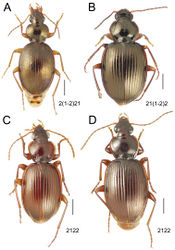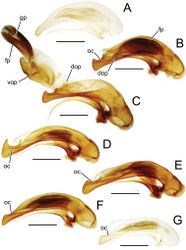Mecyclothorax aano
| Notice: | This page is derived from the original publication listed below, whose author(s) should always be credited. Further contributors may edit and improve the content of this page and, consequently, need to be credited as well (see page history). Any assessment of factual correctness requires a careful review of the original article as well as of subsequent contributions.
If you are uncertain whether your planned contribution is correct or not, we suggest that you use the associated discussion page instead of editing the page directly. This page should be cited as follows (rationale):
Citation formats to copy and paste
BibTeX: @article{Liebherr2013ZooKeys322, RIS/ Endnote: TY - JOUR Wikipedia/ Citizendium: <ref name="Liebherr2013ZooKeys322">{{Citation See also the citation download page at the journal. |
Ordo: Coleoptera
Familia: Carabidae
Genus: Mecyclothorax
Name
Mecyclothorax aano Liebherr, 2013 sp. n. – Wikispecies link – ZooBank link – Pensoft Profile
Diagnosis
This is the broadest bodied species of the Mecyclothorax altiusculus group (Fig. 16B), with a broad pronotum – MPW/PL = 1.29 – and relatively broad elytra standardized by maximum head width; MEW/MHW = 2.45. The elytra are polymorphic for the number of dorsal setae; the left elytron bearing two setae and the right only the anterior seta; thus the setal formula 21(1–2)2. Standardized body length 6.9 mm. Head with broadly convex frons, the frontal grooves narrow posterad and separated from the anterior supraorbital seta by a thin but distinct carina; eyes somewhat bulging dorsally, ocular ratio 1.49, ocular lobe ratio 0.80, the ocular lobe joining the gena at a narrow groove; antennae elongate, filiform, antennomere 8 length 2.33× maximal breadth. Pronotum basally with broadly explanate and upraised lateral margins, the hind angles indicated by a flattened expansion of the margin that looks to all intents and purposes the site for placement of a basal seta (but no seta is present either side); median base distinctly depressed relative to the very convex disc, about 24 small, isolated punctures each side; anterior transverse impression finely, distinctly incised for much of breadth, shallower at midline, with indistinct longitudinal wrinkles crossing anterior callosity; lateral marginal depression narrowest just anterad lateral seta, slightly broader inside broadly rounded front angles, evenly broadened posterad lateral seta to hind angle. Elytra with striae 1–8 deep, complete from basal groove to apex, the discal elytral intervals broadly, moderately convex; the eighth interval broadly carinate apically, extended dorsally above narrowed apex of interval 7, and convexly bulging laterally dorsad the subapical sinuation; lateral elytral setae 7 + 6; apical elytral seta present just laterad stria 2 as it nears stria 7, and subapical elytral seta present in stria 7 just laterad terminal fusion of striae 3 + 4. Microsculpture of vertex reduced, surface glossy, indistinct transverse mesh on neck; pronotal disc glossy, median base mostly glossy but shallow transverse mesh in parts between punctures; discal elytral intervals with a transverse mesh, the sculpticell breadth 2–4× length, mixed with transverse lines, the microsculpture resulting in a coppery reflection. Coloration of head dark rufous; antennomere 1 flavous, 2–3 rufoflavous, 4–11 rufobrunneous; pronotal disc rufopiceous, lateral marginal depression anterad lateral seta rufobrunneous, median base rufous; elytral disc rufopiceous, the sutural interval basally rufous and apically rufoflavous, lateral marginal depression rufobrunneous; femora rufoflavous with brunneous cast, tibiae rufobrunneous with smoky cast most developed in apical half.
Male genitalia. Aedeagal median lobe dorsoventrally expanded apically, with a slightly convex ventral expansion and blunt dorsal tooth (Fig. 18B); ostial canal straight, terminated just ventrad the blunt dorsal tooth; internal sac bearing a large, melanized flagellar plate (Fig. 18C), plate length 0.67× distance from parameral articulations to apical face, with dorsal plate surface bearing elongate gonopore opening; internal sac with broad ventral ostial microtrichial patch and small dorsal ostial microtrichial patch.
Holotype male (MNHN) labeled: French Polynesia: Tahiti Nui / Pito Hito el. 2000 m 2-VI- / 2006 lot 02 pyrethrin fog / 17°36.790'S, 149°27.842'W / E.M. Claridge // HOLOTYPE / Mecyclothorax / aano / J.K. Liebherr 2013 (black-bordered red label).
Etymology
The species epithet aano means wide or extensive in Tahitian, the name signifying the very broad body characteristic of this species.
Distribution and habitat
This species is known only from the holotype obtained in a pyrethrin fog sample of moss-covered vegetation at 2000 m on Pito Hiti.
Original Description
- Liebherr, J; 2013: The Mecyclothorax beetles (Coleoptera, Carabidae, Moriomorphini) of Tahiti, Society Islands ZooKeys, 322: 1-170. doi
Images
|

